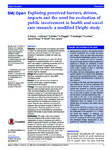Exploring perceived barriers, drivers, impacts and the need for evaluation of public involvement in health and social care research: a modified Delphi study
| dc.contributor.author | Snape, D | |
| dc.contributor.author | Kirkham, J | |
| dc.contributor.author | Britten, N | |
| dc.contributor.author | Froggatt, K | |
| dc.contributor.author | Gradinger, Felix | |
| dc.contributor.author | Lobban, F | |
| dc.contributor.author | Popay, J | |
| dc.contributor.author | Wyatt, K | |
| dc.contributor.author | Jacoby, A | |
| dc.date.accessioned | 2019-10-22T14:03:52Z | |
| dc.date.available | 2019-10-22T14:03:52Z | |
| dc.date.issued | 2014-06-17 | |
| dc.identifier.issn | 2044-6055 | |
| dc.identifier.issn | 2044-6055 | |
| dc.identifier.other | ARTN e004943 | |
| dc.identifier.uri | http://hdl.handle.net/10026.1/15044 | |
| dc.description.abstract |
OBJECTIVE: To explore areas of consensus and conflict in relation to perceived public involvement (PI) barriers and drivers, perceived impacts of PI and ways of evaluating PI approaches in health and social care research. BACKGROUND: Internationally and within the UK the recognition of potential benefits of PI in health and social care research is gathering momentum and PI is increasingly identified by organisations as a prerequisite for funding. However, there is relatively little examination of the impacts of PI and how those impacts might be measured. DESIGN: Mixed method, three-phase, modified Delphi technique, conducted as part of a larger MRC multiphase project. SAMPLE: Clinical and non-clinical academics, members of the public, research managers, commissioners and funders. FINDINGS: This study found high levels of consensus about the most important barriers and drivers to PI. There was acknowledgement that tokenism was common in relation to PI; and strong support for the view that demonstrating the impacts and value of PI was made more difficult by tokenistic practice. PI was seen as having intrinsic value; nonetheless, there was clear support for the importance of evaluating its impact. Research team cohesion and appropriate resources were considered essential to effective PI implementation. Panellists agreed that PI can be challenging, but can be facilitated by clear guidance, together with models of good practice and measurable standards. CONCLUSIONS: This study is the first to present empirical evidence of the opinions voiced by key stakeholders on areas of consensus and conflict in relation to perceived PI barriers and drivers, perceived impacts of PI and the need to evaluate PI. As such it further contributes to debate around best practice in PI, the potential for tokenism and how best to evaluate the impacts of PI. These findings have been used in the development of the Public Involvement Impact Assessment Framework (PiiAF), an online resource which offers guidance to researchers and members of the public involved in the PI process. | |
| dc.format.extent | e004943-e004943 | |
| dc.format.medium | Electronic | |
| dc.language | en | |
| dc.language.iso | eng | |
| dc.publisher | BMJ | |
| dc.subject | Barriers and Drivers | |
| dc.subject | Conflict | |
| dc.subject | Consensus | |
| dc.subject | Evaluation | |
| dc.subject | Impacts | |
| dc.subject | Public Involvement | |
| dc.subject | Attitude | |
| dc.subject | Community Participation | |
| dc.subject | Consensus | |
| dc.subject | Delivery of Health Care | |
| dc.subject | Delphi Technique | |
| dc.subject | Humans | |
| dc.subject | Research | |
| dc.subject | Sociological Factors | |
| dc.title | Exploring perceived barriers, drivers, impacts and the need for evaluation of public involvement in health and social care research: a modified Delphi study | |
| dc.type | journal-article | |
| dc.type | Journal Article | |
| dc.type | Research Support, Non-U.S. Gov't | |
| plymouth.author-url | https://www.webofscience.com/api/gateway?GWVersion=2&SrcApp=PARTNER_APP&SrcAuth=LinksAMR&KeyUT=WOS:000339717100054&DestLinkType=FullRecord&DestApp=ALL_WOS&UsrCustomerID=11bb513d99f797142bcfeffcc58ea008 | |
| plymouth.issue | 6 | |
| plymouth.volume | 4 | |
| plymouth.publication-status | Published | |
| plymouth.journal | BMJ Open | |
| dc.identifier.doi | 10.1136/bmjopen-2014-004943 | |
| plymouth.organisational-group | /Plymouth | |
| plymouth.organisational-group | /Plymouth/Faculty of Health | |
| plymouth.organisational-group | /Plymouth/Faculty of Health/Peninsula Medical School | |
| plymouth.organisational-group | /Plymouth/REF 2021 Researchers by UoA | |
| plymouth.organisational-group | /Plymouth/REF 2021 Researchers by UoA/UoA20 Social Work and Social Policy | |
| plymouth.organisational-group | /Plymouth/Research Groups | |
| plymouth.organisational-group | /Plymouth/Research Groups/FoH - Community and Primary Care | |
| plymouth.organisational-group | /Plymouth/Research Groups/Institute of Health and Community | |
| plymouth.organisational-group | /Plymouth/Users by role | |
| plymouth.organisational-group | /Plymouth/Users by role/Academics | |
| dc.publisher.place | England | |
| dc.identifier.eissn | 2044-6055 | |
| dc.rights.embargoperiod | Not known | |
| rioxxterms.versionofrecord | 10.1136/bmjopen-2014-004943 | |
| rioxxterms.licenseref.uri | http://www.rioxx.net/licenses/all-rights-reserved | |
| rioxxterms.type | Journal Article/Review |


